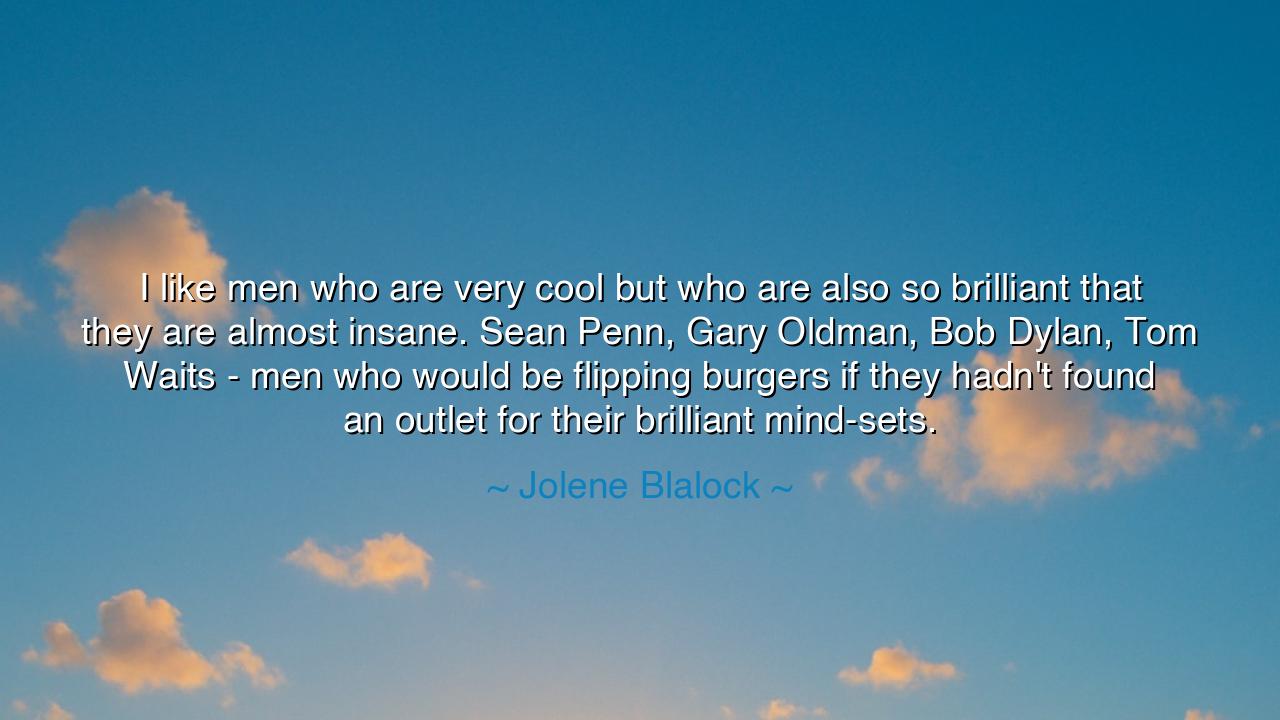
I like men who are very cool but who are also so brilliant that
I like men who are very cool but who are also so brilliant that they are almost insane. Sean Penn, Gary Oldman, Bob Dylan, Tom Waits - men who would be flipping burgers if they hadn't found an outlet for their brilliant mind-sets.






"I like men who are very cool but who are also so brilliant that they are almost insane. Sean Penn, Gary Oldman, Bob Dylan, Tom Waits - men who would be flipping burgers if they hadn't found an outlet for their brilliant mind-sets." These words by Jolene Blalock speak to the deep admiration for individuals whose genius and coolness transcend the conventional boundaries of society. These men—Penn, Oldman, Dylan, and Waits—embody the fascinating duality of brilliance and eccentricity, individuals whose talents and visions are so vast that without the right outlet, they could have been lost to the mundanity of everyday life. In this quote, Blalock is expressing a reverence for those whose creative minds and bold spirits have shaped the world, transforming what could have been seen as madness into masterpieces.
In the ancient world, there were many such figures—individuals whose brilliance could not be confined to the ordinary roles that society tried to assign them. Socrates, for example, was considered an eccentric by many of his contemporaries. His questioning nature, his refusal to conform to societal norms, and his deep philosophical insights could have easily led him down a path of obscurity. Instead, he challenged the very foundations of his society, leading to a philosophical revolution that still echoes in the world today. Similarly, Aristotle, though deeply revered, often stood apart in his thinking, pushing the boundaries of knowledge to such an extent that some of his ideas seemed at odds with the world of his time. In these figures, we see the same brilliance and coolness that Blalock admires in modern individuals.
Just as the ancient philosophers were considered “mad” by some for their refusal to accept conventional wisdom, the figures Blalock praises—Penn, Oldman, Dylan, and Waits—are celebrated for their unique creativity and uncompromising individuality. These men are artists, actors, and musicians who, through their boldness and eccentricity, have reshaped their respective fields. Bob Dylan, with his lyrical genius, changed the landscape of folk music and became the voice of a generation. Sean Penn, known for his intensity and controversial roles, has often expressed his personal turmoil and genius through his art, both on screen and in his social activism. These are men whose visionary minds could never be satisfied by the “ordinary” path. Without the outlet of art and performance, they might very well have been trapped in the mundane realities of everyday life, their brilliance untapped and their genius unrecognized.
History is filled with similar examples of individuals whose potential was almost squandered, and whose brilliance, if not given an outlet, might have faded into obscurity. Take, for example, Vincent van Gogh, who spent much of his life in relative isolation, struggling with poverty and mental health. Had it not been for the visionary support of his brother Theo and the eventual discovery of his paintings after his death, van Gogh’s genius might never have reached the world. Instead, his work has inspired generations of artists and remains a beacon of the beauty that arises from the depths of personal struggle. Like the men Blalock praises, van Gogh’s mind was so far ahead of its time that it almost seemed to border on insanity.
The lesson of Blalock's quote is a powerful one: it reminds us of the profound value of giving outlets to the brilliant minds that populate our world. These individuals may be misunderstood or even ridiculed for their eccentricity and nonconformity, but their creativity and vision often have the power to transform societies. Just as the world would have been a lesser place without the genius of figures like Dylan or Socrates, so too would our society suffer without the artists, thinkers, and creators who challenge us to see the world in new ways.
In our own lives, it is crucial that we nurture the creative talents and visions of those around us. Whether we are the creators ourselves or simply supporters of those with brilliant minds, we must ensure that the world offers room for those who do not fit the traditional mold. Art and creativity should be celebrated, not confined. For the greatest minds and most visionary spirits are often those who, left unchecked, may spiral into frustration or obscurity. It is through support, recognition, and appreciation that we can ensure these brilliant minds find their outlet and, in doing so, change the world.
Thus, let us take inspiration from Blalock's words and the examples of ancient and modern icons who have shaped our world with their brilliance. We must create spaces in our societies where eccentricity and brilliance are seen not as liabilities but as treasures. Whether in the arts, sciences, or any field of human endeavor, we must encourage the wild, untamed creativity that has the potential to spark revolution and transformation. The men Blalock praises are not just cool because of their talents, but because their genius has found a way to be expressed. Let us ensure that we do the same for all those who come after us.






AAdministratorAdministrator
Welcome, honored guests. Please leave a comment, we will respond soon